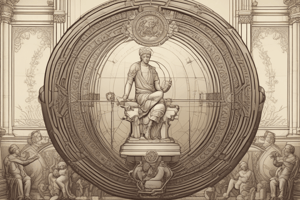Podcast
Questions and Answers
What is the primary purpose of intellectual property rights?
What is the primary purpose of intellectual property rights?
To protect the creations of inventors and artists, encouraging innovation and creativity.
How can computer ethics influence the development and use of intellectual property?
How can computer ethics influence the development and use of intellectual property?
Computer ethics can guide fair use and respect for creators' rights, promoting ethical behavior in digital environments.
What is the minimum amount of damages a court may award for innocent infringement?
What is the minimum amount of damages a court may award for innocent infringement?
$200
Explain the term 'patent' in the context of intellectual property.
Explain the term 'patent' in the context of intellectual property.
What is the maximum amount of damages a court can award for willful infringement?
What is the maximum amount of damages a court can award for willful infringement?
What role does society play in shaping computer ethics related to intellectual property?
What role does society play in shaping computer ethics related to intellectual property?
How does the court's discretion in awarding damages affect the outcome for infringements?
How does the court's discretion in awarding damages affect the outcome for infringements?
Identify one challenge that arises in the realm of intellectual property in the digital age.
Identify one challenge that arises in the realm of intellectual property in the digital age.
Why might a court choose to award damages on the lower end of the scale?
Why might a court choose to award damages on the lower end of the scale?
What implications does the difference in damage awards have for potential infringers?
What implications does the difference in damage awards have for potential infringers?
What constitutes copyright infringement?
What constitutes copyright infringement?
Why is permission necessary to copy copyrighted work?
Why is permission necessary to copy copyrighted work?
What does 'substantial and material part' refer to in the context of copyright infringement?
What does 'substantial and material part' refer to in the context of copyright infringement?
Can minor copying of copyrighted work lead to infringement? Why or why not?
Can minor copying of copyrighted work lead to infringement? Why or why not?
What should individuals do if they wish to use someone else's copyrighted work?
What should individuals do if they wish to use someone else's copyrighted work?
What is covered under copyright law?
What is covered under copyright law?
What can happen as new forms of expression develop in relation to copyright protection?
What can happen as new forms of expression develop in relation to copyright protection?
What is the purpose of patent law?
What is the purpose of patent law?
What right can a copyright owner grant to others?
What right can a copyright owner grant to others?
How does trade secret law function in a business context?
How does trade secret law function in a business context?
What is intellectual property in a broader sense?
What is intellectual property in a broader sense?
Why is it important to protect intellectual property?
Why is it important to protect intellectual property?
How does the development of new forms of expression impact copyright?
How does the development of new forms of expression impact copyright?
Why is it important for new forms of expression to receive copyright protection?
Why is it important for new forms of expression to receive copyright protection?
How is software interpreted in relation to a computer's internal structure?
How is software interpreted in relation to a computer's internal structure?
What legal protection can software obtain due to its treatment as a process?
What legal protection can software obtain due to its treatment as a process?
Why is the treatment of software as a process significant for its protection?
Why is the treatment of software as a process significant for its protection?
In what instances is software considered for patent law protection?
In what instances is software considered for patent law protection?
What implications arise from considering software as a process for changing internal structures?
What implications arise from considering software as a process for changing internal structures?
Flashcards
Computer Ethics
Computer Ethics
The study of ethical issues related to computers and their impact on society.
Intellectual Property
Intellectual Property
The area of law that protects creations of the mind, such as inventions, literary and artistic works, and symbols, names, and images used in commerce.
Code of Ethics
Code of Ethics
A set of principles that guide the ethical use of computers and related technologies.
Social Impact of Technology
Social Impact of Technology
Signup and view all the flashcards
Responsible Technology Use
Responsible Technology Use
Signup and view all the flashcards
Software as a process
Software as a process
Signup and view all the flashcards
Patent Protection
Patent Protection
Signup and view all the flashcards
Software Patentability
Software Patentability
Signup and view all the flashcards
Patent Law's Goal
Patent Law's Goal
Signup and view all the flashcards
Computer's Internal Structure
Computer's Internal Structure
Signup and view all the flashcards
What is Intellectual Property (IP)?
What is Intellectual Property (IP)?
Signup and view all the flashcards
Copyright Law
Copyright Law
Signup and view all the flashcards
Patent Law
Patent Law
Signup and view all the flashcards
Trade Secret Law
Trade Secret Law
Signup and view all the flashcards
Why are IP rights important?
Why are IP rights important?
Signup and view all the flashcards
Copyright Protection for New Forms of Expression
Copyright Protection for New Forms of Expression
Signup and view all the flashcards
Copyright
Copyright
Signup and view all the flashcards
Copyright Infringement
Copyright Infringement
Signup and view all the flashcards
Exclusive Rights Transfer
Exclusive Rights Transfer
Signup and view all the flashcards
Legal Penalties for Copyright Infringement
Legal Penalties for Copyright Infringement
Signup and view all the flashcards
Copyright Infringement Damages
Copyright Infringement Damages
Signup and view all the flashcards
Willful Copyright Infringement
Willful Copyright Infringement
Signup and view all the flashcards
Innocent Copyright Infringement
Innocent Copyright Infringement
Signup and view all the flashcards
Judicial Discretion in Copyright Infringement Damages
Judicial Discretion in Copyright Infringement Damages
Signup and view all the flashcards
Minor Copyright Infringement
Minor Copyright Infringement
Signup and view all the flashcards
Patent
Patent
Signup and view all the flashcards
Substantial Part
Substantial Part
Signup and view all the flashcards
Study Notes
Intellectual Property
- Intellectual property encompasses works of the mind, like art, books, films, inventions, music, and processes, distinct and owned by an individual or group.
- It's protected by copyright, patent, and trade secret laws.
Objectives
- Students should be able to define intellectual property, and the measures organizations use to protect it following this lecture.
- Students should also understand current issues associated with intellectual property protection.
What is Intellectual Property?
- Copyright protects authored works (art, books, film, music).
- Patent law protects inventions.
- Trade secret law protects information vital to an organization's success.
What is Intellectual Property? Defining and Controlling
- Defining and controlling access levels to intellectual property is complex.
- Software protection is particularly challenging due to its categorization under existing laws.
- Software is sometimes viewed as an expression of an idea, and so is protectable under copyright law.
- Software can also be viewed as a process to alter a computer's internal structure and so is protectable under patent law.
Copyrights
- Copyright grants the exclusive right to distribute, display, perform, or reproduce an original work.
- The copyright's owner can grant this right to others.
- New expressions of ideas can get copyright protection.
- Copyright infringement results from unauthorized substantial copying of another's protected work.
- Courts have wide discretion in awarding damages for infringement, from minimal to substantial.
Copyrights-Eligible Works
- Architecture, art, audiovisual works, choreography, drama, graphics, literature, motion pictures, music, pantomimes, pictures, sculptures, sound recordings, and other intellectual works are eligible for copyright protection.
Copyrights-Fair Use Doctrine
- Copyright law balances author's rights with public access.
- The "fair use" doctrine allows limited use of copyrighted material without permission in certain circumstances.
Software Copyright Protection
- Copyright use for software protection creates complex interpretation issues.
- A software manufacturer could observe a competitor's software, and create a similar product/program, resulting in potential legal complications.
Studying That Suits You
Use AI to generate personalized quizzes and flashcards to suit your learning preferences.




